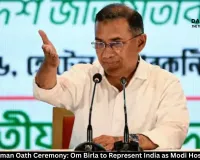Afghanistan refuses to release water to Pakistan
Digital Desk

After India, now Afghanistan is also preparing to build dams to stop water flowing towards Pakistan. The Afghan Ministry of Information shared this information in a post on X on Thursday.
The Information Ministry said that Taliban's supreme leader Mawlawi Hibatullah Akhundzada has ordered to build a dam on the Kunar River as soon as possible.
Ministry's Deputy Minister Muhajir Farahi said on Thursday that the Ministry of Water and Energy has been asked to start dam construction quickly by contracting domestic companies. They don't have to wait for foreign companies. Afghanistan took this decision after the recent conflict.
In clashes that lasted from October 9 to October 18, 37 Afghan citizens were killed and 425 were injured. Meanwhile, India had also suspended the Indus Water Treaty on April 23 after the Pahalgam terror attack and stopped water flowing towards Pakistan.
Pakistan uses 70-80% water of Kunar River
The 480-kilometer-long Kunar River flows from Afghanistan and joins the Kabul River in Pakistan as the Chitral River. 70-80% of Kunar River's water comes to Pakistan.
This Kabul River then merges with the Indus River. If Afghanistan builds a dam and blocks Kunar's water, Pakistan will suffer serious losses.
This will directly affect Khyber Pakhtunkhwa (KPK). Areas like Bajaur and Mohammad are completely dependent on this river for agriculture. If irrigation stops, the risk of crop destruction will increase.
In addition, more than 20 small hydel projects running on the Kunar River in Pakistan's Chitral district will be affected by water stoppage. All these projects are run-of-river, meaning they generate electricity directly from river flow.
45MW power will be generated, 1.5 lakh acres of farming will get water
Earlier, Taliban's Ministry of Water and Energy spokesperson Matiullah Abid had said that the survey and design of this dam has been completed.
The Taliban government claims that once this project is completed, it will generate 45 megawatts of electricity and provide irrigation water to approximately 1.5 lakh acres of farmland. This will improve energy crisis and food security in Afghanistan.
No agreement between Pakistan-Afghanistan regarding Kunar River
There is no formal bilateral agreement between Pakistan and Afghanistan regarding water sharing of Kabul River and its tributaries.
Pakistan has previously expressed concerns about Afghanistan's dam projects, as these could reduce water supply to its territory.
Taliban's decision came after conflict with Pakistan
The conflict between Pakistan and Afghanistan began on October 9th. Pakistan attacked Tehreek-e-Taliban Pakistan (TTP) bases in Kabul. After this, Afghanistan held Pakistan responsible for border disputes and airspace violations.
According to the UN, 37 Afghan civilians were killed and 425 were injured in Pakistani attacks. Afghanistan's Taliban government accused Pakistan of targeting civilian areas, while Pakistan says it took action against terrorist bases.
In fact, the root of the dispute between the two countries is the Durand Line, which was drawn between India and Afghanistan during the British era. It divides the traditional land of both countries and Pathans on both sides never accept it.
India cancels Indus Water Treaty with Pakistan
India has cancelled the Indus Water Treaty with Pakistan following the terrorist attack in Pahalgam, Jammu and Kashmir on April 22.
The treaty, signed in 1960, governs the waters of six rivers, Indus, Jhelum, Chenab, Ravi, Beas, and Sutlej, which flow through an area of about 11.2 lakh square kilometres. Of this land, 47% is in Pakistan, 39% in India, 8% in China, and 6% in Afghanistan. Around 30 crore people live in this region.
Disputes over river water sharing between Punjab in India and Sindh in Pakistan began even before the 1947 partition. On September 19, 1960, India’s PM Nehru and Pakistan’s President Ayub Khan signed the agreement in Karachi, known as the Indus Water Treaty.
Afghan Foreign Minister visited India
Afghanistan's decision came after Taliban Foreign Minister Amir Khan Muttaqi's visit to India. Muttaqi came to India on October 9, during which he met with External Affairs Minister S Jaishankar. Both sides expressed their commitment to hydro-electricity cooperation.
India has two major projects running in Afghanistan. These include the Salma Dam and Shahtoot Dam. The Salma Dam was built in Herat in 2016 at a cost of 300 million dollars.
Meanwhile, the Shahtoot Dam will be built on a tributary of the Kabul River at a cost of around ₹2,000 crore. India is bearing its entire cost. This will provide drinking water to 20 lakh people and enable farming on 4,000 hectares. It is expected to be completed by 2026.


.jpg)








